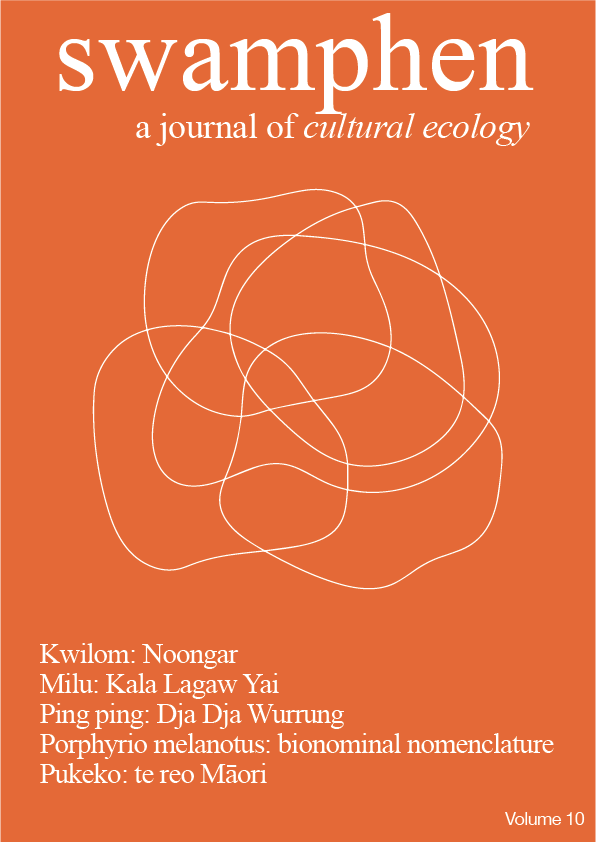Ink, Vomit, Blood, and Water
The Ripple Effects of Care, Carelessness, and Violence in 'The Octopus and I'
DOI:
https://doi.org/10.60162/swamphen.11.18126Keywords:
care, violence, ecofeminism, ethics of care, climate change, animal studiesAbstract
Non-human animals have long acted as intermediaries for human conception of self and as vehicles that generate moral transformation. A wave of young Australian authors has brought about a surge in novels that explore human intimacy with animals in narratives that expose the human threat to ecological equilibrium. This paper looks specifically at Erin Hortle’s novel The Octopus and I (2020) and the region of the Tasman Peninsula, examining how the novel reflects the larger forces of environmental, patriarchal, and colonial violence that pervade contemporary Tasmania. Hortle contests this violence by outlining ethical engagements between humans, and between humans and animals, enacting a philosophy of the world based on relationality to self, human others, and to animal other. While Hortle focuses on her protagonist, Lucy’s, encounters with octopuses, the broader narrative is interwoven with the voices of octopuses, seals, and a mutton-bird, reflecting a contemporary literary approach that situates human narratives of self within a broader multispecies framework of myriad perspectives and conflicting interests.
Hortle’s novel is a particularly interesting case study through which to engage with a feminist ethics of care, for while the novel clearly values caring relationships and highlights exploitative violence, her cast of female and male characters demonstrate the capacity for both care and violence, radically subverting the stereotypical alignment of femininity with care and masculinity with violence. In the ink, vomit, and blood that appear in the novel, Hortle renders visible and visceral the violence that manifests in Tasmania and that humans commit. While Hortle highlights the error of carelessness, regardless of gender, she also draws attention to the connections between feminism, care, and the maternal, specifically linking her female characters with care. Hortle thus valorises feminist care and its recognition of responsibility and interdependency as an essential aspect of our relationship to the nonhuman world and specifically to animals. Drawing on Astrida Neimanis’ concept of a ‘hydrocommons,’ Hortle’s use of an island setting and embeddedness in watery locations, the dominance of marine animals, focus on animal gestation, the maternal and paternal, and on how Lucy contends with her infertility, womanhood, and femininity, each inform my analysis of the liquid manifestations of violence in the novel. Many novels provide polemic responses to contemporary problems like those of ethical care for self, neighbour, and animal yet for Hortle, fiction has limits – it can expose ambiguities but cannot offer the solace of resolution to such ethical complexities. This paper engages with Hortle’s depiction of care, carelessness, and violence and how they ripple out to manifest in relations to self, others, and animals. By focusing specifically on the space of Tasmania and the structural carelessness and violence embedded in contemporary colonial relationships to land, Hortle points to the complexity of ethical care in a context of climate change but ultimately endorses care and careful relations to self, others, and animals.
References
DeLoughrey, Elizabeth. ‘Care.’ Women’s Studies, vol. 50, no. 8 (2021): pp. 812–19,
https://doi.org/10.1080/00497878.2021.1994317.
Douglas-Kinghorn, Zowie. ‘Do Cephalopods Dream of the Anthropocene? [Book Review].’ Meanjin, vol. 80, no. 2 (2021): pp. 205–07, https://meanjin.com.au/books/do-cephalopods-dream-of-the-anthropocene/.
Haraway, Donna. The Companion Species Manifesto: Dogs, People, and Significant Otherness. Chicago: Prickly Paradigm Press, 2003.
--- When Species Meet. Minneapolis: University of Minnesota Press, 2008.
Hortle, Erin. The Octopus and I. Allen & Unwin, 2020.
McKibbin, Philip. ‘Consider the Tītī: Re-imagining Indigenous Relationships with Non-Human Animals’ [Conference abstract] In Australasian Animal Studies Association Conference 2023 Animal Cultures, University of Sydney: 27-28 November 2023, https://animalstudies.org.au/wp-content/uploads/2023/11/AASA-2023-Conference-Abstracts20231114.pdf.
Neimanis, Astrida. Bodies of Water: Posthuman Feminist Phenomenology. Bloomsbury Academic, 2016.
Puig de la Bellacasa, Maria. “‘Nothing Comes without Its World:” Thinking with Care.’ The Sociological Review, vol. 60, no. 2 (2012): pp. 197-216.
Tasmanian Government. ‘Muttonbirding.’ The Orb, (2022), https://www.theorb.tas.gov.au/living-cultures/muttonbirding.
van Dooren, Thom. ‘Care.’ Environmental Humanities, vol. 5, no. 1 (2014): pp. 291–94,
https://doi.org/10.1215/22011919-3615541.
Vincent, Eve, and Timothy Neale, eds. Unstable Relations: Indigenous People and Environmentalism in Contemporary Australia. Crawley: UWA Publishing, 2016.
White, Georgia. ‘Our octopuses, ourselves [Book Review].’ Overland, (2020),
https://overland.org.au/2020/09/our-octopuses-ourselves/.
Wolfe, Patrick. Settler Colonialism. Bloomsbury Publishing, 1999.
Downloads
Published
Issue
Section
License
Authors who publish with this journal agree to the following terms:- Authors retain copyright and grant the journal right of first publication with the work simultaneously licensed under a Creative Commons Attribution License that allows others to share the work with an acknowledgement of the work's authorship and initial publication in this journal.
- Authors are able to enter into separate, additional contractual arrangements for the non-exclusive distribution of the journal's published version of the work (e.g., post it to an institutional repository or publish it in a book), with an acknowledgement of its initial publication in this journal.
- Authors are permitted and encouraged to post their work online (e.g., in institutional repositories or on their website) prior to and during the submission process, as it can lead to productive exchanges, as well as earlier and greater citation of published work (See The Effect of Open Access).

